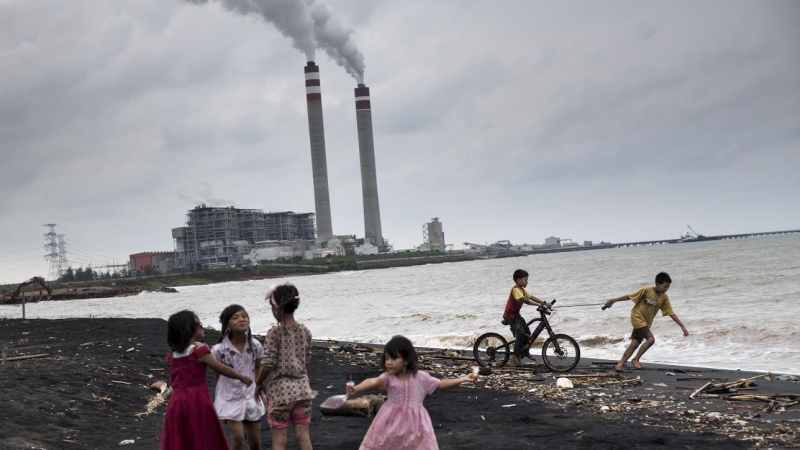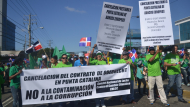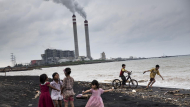Post-Paris, and the dodgy coal deals are already sprouting up in 2016

Bangladesh’s Rampal moves forward, as bank interest in the Dominican Republic’s Punta Catalina plant and Indonesia’s Tanjong Jati B raises concerns over the strength of their climate commitments
As we’ve been settling into the new year and wondering how visible and – crucially – rapid any genuine follow through from the words of the Paris climate summit would be, there’s been a nagging concern at the back of our minds: in what’s supposed to be these new, ambitious ‘1.5 degree Celsius limit’ times, what’s going to be the first major new coal installation investment of 2016, and who’s going to be bankrolling it?
Along with a colleague in Bangladesh, we warned even before the Paris COP had concluded that the UNESCO mangrove forest threatening Rampal coal power plant had the potential to be an early acid test of the post-Paris reality for coal investments. What the Paris summit most definitely changed is that coal, and other fossil fuels, have effectively been put on notice that their time is coming to an end. The issue, though, remains – how quickly?
Disappointingly then, news arrived on January 18 that the Indian power company Bhel has been selected by the Rampal project promoter, the joint venture Bangladesh-India Friendship Company, to construct the 1,320 megawatt coal plant close to the Sundarbans mangrove forest. Bangladesh’s Daily Star reports that Bhel will have to arrange finance – $1.39 billion – from the Indian Exim Bank, an export credit agency, on behalf of the Friendship Company. How UNESCO will respond in the coming weeks and months, to this apparent green-lighting of a project which it has already expressed major concerns about, remains to be seen.
While it would appear that at least some private banks have got the message about the reputational and climate risks involved in the Rampal project (the FT recently carried a good overview article), two other coal plant projects have also just crossed our radar – both featuring some very familiar European banking names.
On December 30, coal plant projects at Punta Catalina in the Dominican Republic received a first disbursement of USD 200 million from Societe Generale, ING, Unicredit, Deutsche Bank and Banco Santander. For ING in particular, this kind of financing is highly embarrassing – at the end of November last year, the Dutch bank announced a new policy ruling out the financing of new coal power and mining projects. As we suspected, however, and as has been confirmed by an ING official, this Punta Catalina deal was signed in mid-2015, before ING’s new policy came into being.
All the same, not the smartest look for a bank which we judge to be one of the most progressive globally when it comes to getting off the coal finance conveyor belt – and, as local media reports suggest, there is a growing storm of local protest and legal actions around the likely environmental and health impacts of these coal plant developments. On Twitter, #PuntaCatalina will be one to watch in 2016, as will any future disbursements from the European lenders – there is potentially over USD 400 million still to come for these coal plants.

Children playing by the beach near the Tanjung Jati B coal power plant in Jepara, Central Java, oblivious to the possible threats to their health - 26 December 2012. Copyright Kemal Jufri / Greenpeace
Societe Generale also features in what has the potential to be an alarming addition to Indonesia’s already highly toxic coal station fleet.
According to a subscription note we’ve seen from Associated Press (January 8): “Two French banks – Credit Agricole and Societe Generale – are understood to have joined the lending group for the expansion of Tanjong Jati B (TJB2) coal-fired power plant, following the withdrawal of BNP Paribas. They are joining BTMU, Mizuho Bank, SMBC and Sumitomo Trust. Sumitomo Corp is sponsor to the additional 2,000MW capacity which is estimated to cost US$4bn. Debt amount is about US$3bn with a tenor of 23 years. SMBC is financial adviser while Latham & Watkins is legal adviser. The financing is targeted to be completed within these six months.”
Tanjung Jati B is a 2400MW coal-fired power plant in Jepara, Central Java. Its already existing four units, brought into operation between 2006 and 2012, feature in a Greenpeace report published in August 2015 which assesses how coal-fired power plants threaten the health of Indonesians.
According to Greenpeace, who worked on this study with researchers at Harvard University, Tanjung Jati B is estimated to be responsible for “1020 premature deaths per year, including 450 deaths from stroke, 400 deaths from ischemic heart disease, 60 deaths from lung cancer, 90 deaths from chronic respiratory diseases and 20 deaths of small children due to acute respiratory diseases.”
The extension at Tanjung Jati B is part of a current, staggering Indonesian government plan to build over 100 new coal-fired power plants. According to the Harvard research in the Greenpeace study, if these plants are completed the death toll from coal power in Indonesia could rise from the current estimated 6,500 premature deaths every year to 28,300 people every year.
It will be interesting to learn why BNP Paribas decided to withdraw from this deal, and why Credit Agricole and Societe Generale have jumped on it since last year the three French banks adopted some restrictions (see here and here) to their coal financing in the lead up to COP 21 in Paris. By getting involved in Tanjung Jati B, they're putting in jeopardy their climate commitments and last year's good policy moves, and raising concerns about other potential coal financing in 2016.


